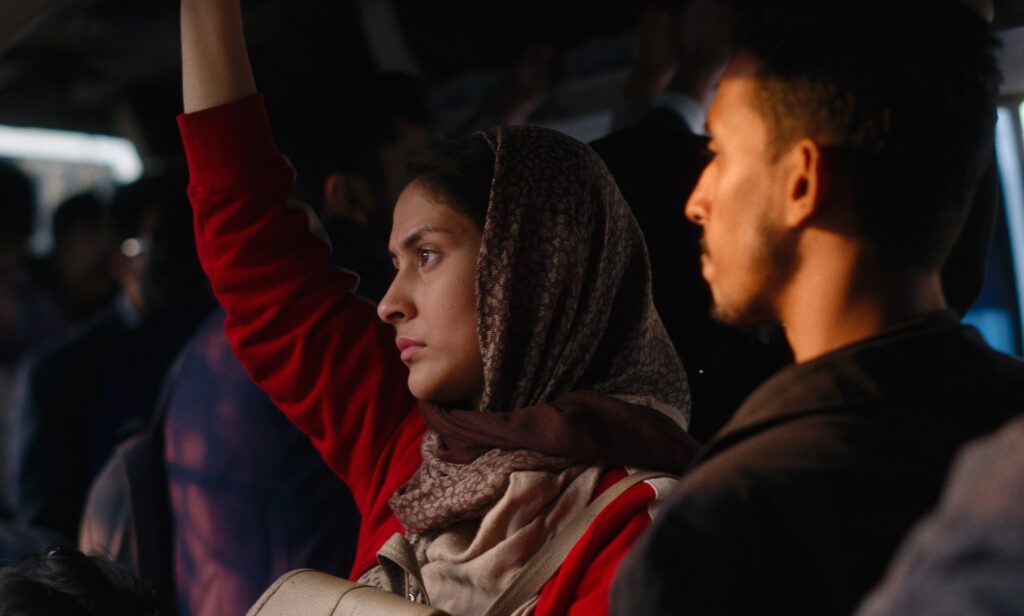In Saba, debutant director Maksud Hossain crafts a quietly powerful film set in the teeming heart of Dhaka, Bangladesh. It follows 25-year-old Saba, a young woman who has voluntarily stepped into a role of filial duty stretched to its breaking point. What could have descended into melodrama becomes, in Hossain’s steady hands, a deeply sensitive human story as it charts the collapse of hope under the weight of circumstance.
Saba (Mehazabien Chowdhury) is tethered to the unrelenting demands of her paraplegic mother, Shirin (Rokeya Prachi). Having spent her life in service to her mother, Saba finds herself in a crisis when Shirin suffers a heart attack. She must urgently raise 300,000 taka for her mother’s life-saving surgery. With family support uncertain, she considers selling their home. She reaches out to her uncle, the only relative who might help. But he must first persuade his wife – Shirin’s estranged sister – to co-sign the sale. With few options left, Saba accepts a job at a seedy hookah lounge, where she grows close to its manager, Ankur (Mostafa Monwar), who helps her secure the position. As obstacles continue to mount, Saba is forced to navigate a series of moral and emotional crossroads, driven by a singular goal. To save her mother at any cost…
The three principal characters in Saba are each trapped in their quiet prisons, in a city where hope is as scarce as clean water. Shirin refuses to sell the house for her treatment, not out of selfishness, but because she wants to preserve the property for her daughter. She cannot move past the reality that her husband abandoned her decades ago, and a quiet sorrow takes hold of her as she flips through an old family album. Ankur, meanwhile, dreams of escaping to France, having long given up on any future in Dhaka. To fund his departure, he bootlegs on the side, fully aware that morality is a luxury few can afford. And then there is Saba, the film’s heartbeat — resilient, determined, and painfully aware that she may soon be alone. A university dropout, she has put her life on hold to care for her mother, yet she clings to returning to her studies one day. Through these three characters, Hossain builds a quietly scathing portrait of a society in disrepair: where sewage leaks into the supply water, where bribes can settle charges for public drinking, and where a woman working at a hookah lounge is assumed to be a prostitute.
Its unwavering, unsentimental gaze elevates Saba beyond the realm of conventional social realism. Hossain, along with co-writer Trilora Khan, refuses to romanticize hardship; instead, he maps the terrain of Saba’s desperation with precision and empathy, as her mother’s deteriorating heart condition makes the possibility of life-saving surgery feel more like a distant dream. Saba feeds and bathes her mother, changes her diapers, and performs every act of care with the devotion of a daughter who has known no other life. But when pushed to the edge, she is not above arguing, or even erupting in frustration. The bittersweet dynamic between mother and daughter pulses through the film with authenticity. And in a rare moment of reprieve, when Saba, Shirin, and Ankur embark on an outing, it offers a short-lived sense of bliss – a physical escape from their burdens. But more than that, it grants a fleeting breath of emotional relief, reminding us that even in a life worn down by hardship, moments of grace are still possible.
Saba is also a character study forged in slow-burning despair. It is an unflinching exploration of sacrifice so deep that even love begins to feel like entrapment. The film offers no easy catharsis, no comforting redemption. Instead, it poses the harder question: how much can one give before the act of giving erases the self? The congested apartment that Saba shares with her mother feels stifling, yet Hossain finds lyricism in its details – a birdcage in the loft, the ambient noise of Dhaka’s restless streets, the fleeting warmth of Kacchi Biryani. Saba’s attempts to raise money for her mother’s surgery are not framed as melodramatic turns but as part of the grim logic of survival in a system that offers no safety net. Hossain is not content to merely depict misfortune; he reveals how it permeates every aspect of life, shaping desire, narrowing choices, and sharpening the stakes of each decision.
Mehazabien Chowdhury grounds Saba with restrained power, capturing the slow erosion of spirit with a weariness that feels lived-in. Her silences speak louder than words. Rokeya Prachy is riveting as Shirin, a woman clinging to pride and control, even as her body fails her. Mostafa Monwar lends Ankur a quiet grace, his calm masking a deeper pain. Together, they form the film’s aching, human core.
Barkat Hossain Polash’s camera stays close but is never intrusive, capturing raw moments with lived-in realism. We follow the characters, always near, grasping at their inner lives. Sameer Ahmed’s editing embraces stillness, letting silences linger and resonate, giving weight to what remains unsaid. Niraj Gera’s sound design captures the unease of Dhaka’s urban chaos – a constant presence that seeps into the lives of the three characters, creating an atmosphere where tension simmers even in silence. Amman Abbasi’s music underscores the emotional terrain with quiet, unobtrusive grace.
Saba is not about misery – it is a film about endurance. In its quiet refusal to look away from class divides and broken systems, it discovers a haunting, deeply human power. As a debutant, Maksud Hossain shows striking confidence, marking him as a filmmaker to watch out for.
Following its premiere at the Toronto International Film Festival (TIFF) last year, the film won the prize for the third-best Asian film at this year’s Bengaluru International Film Festival.
Bengali, Drama, Color


